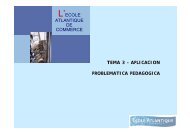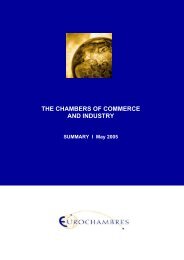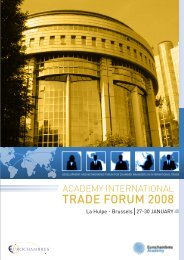Project Management - Eurochambres Academy
Project Management - Eurochambres Academy
Project Management - Eurochambres Academy
- No tags were found...
You also want an ePaper? Increase the reach of your titles
YUMPU automatically turns print PDFs into web optimized ePapers that Google loves.
<strong>Project</strong> <strong>Management</strong>EUROCHAMBERS27th June 2002Marc Baetens, , PMPm.baetensbaetens@yucom.be
<strong>Project</strong> <strong>Management</strong>• Agenda• Introduction into PM Principles• Scope <strong>Management</strong>• Time <strong>Management</strong>• Performance Reporting• Change Control• Risk <strong>Management</strong>• <strong>Project</strong> ClosureEuroChambers – Munich 2002<strong>Project</strong> <strong>Management</strong>
a <strong>Project</strong>« A <strong>Project</strong> is a temporaryendeavour undertaken to create aunique product or service »© PMI 1996EuroChambers – Munich 2002<strong>Project</strong> <strong>Management</strong>
Why <strong>Project</strong>s• Different then Operations• Better control• Specific, unique goals• TimingEuroChambers – Munich 2002<strong>Project</strong> <strong>Management</strong>
Definition of <strong>Project</strong><strong>Management</strong>• <strong>Project</strong> <strong>Management</strong> is theapplication of knowledge, skills,tools, and techniques to projectactivities in order to meet projectrequirements.EuroChambers – Munich 2002<strong>Project</strong> <strong>Management</strong>
Art of <strong>Project</strong> <strong>Management</strong>• PM means balancing competing demandsamong:• Scope, time, cost, resources, risks,communication and quality• Stakeholders with differing needs andexpectations• Identified requirements (needs) andunidentified requirements (expectations)EuroChambers – Munich 2002<strong>Project</strong> <strong>Management</strong>
Why <strong>Project</strong>s Fail ? Why <strong>Project</strong>s Overrun ?• Unclear objectives andrequirements• Lack of businesscommitment• Business requirementschanging• Poor communication• Poor quality steeringgroup• Poor project planning• Company and projectpoliticsEuroChambers – Munich 2002• Poorly defined businessobjectives and scope• Lack of estimating techniques• Insufficiently detailed WBS• No business ownership• Inadequate status report• No change control system• Uncontrolled 3rd parties<strong>Project</strong> <strong>Management</strong>KPMG Study, 1989The Computer Bulletin, January 2000, pp24 - 26
Problems in understandingeach other?As proposed by the projectsponsorAs specified in the projectrequestAs designed by the senioranalystAs produced by theprogrammersEuroChambers – Munich 2002As installed at the user’s site<strong>Project</strong> <strong>Management</strong>What the user wanted
Goal conflicts ??<strong>Project</strong> ManagerPeople & skillsToolsBudgetStable technologyAdequate time & effortWell defined requirementsCustomerRelease timeMeets requirementsFlexible for changesLow costImproved efficiency<strong>Management</strong>Market shareROIOthersPublicPressEuroChambers – Munich 2002<strong>Project</strong> <strong>Management</strong>
<strong>Project</strong> <strong>Management</strong> Competence? ! #Staff DevelopmentDecisionincluding hiringmaking TeambuildingRelationshipCommunication <strong>Management</strong> Influencingthe organisationFlexibilityCreativity &InnovationProblemSolvingSkillsMentoringSkillsNegotiatingSkillsWritingSkillsLeadershipPresentationSkillsQuality<strong>Management</strong>FacilitatingSkillsFinance &ProfitabilitySkillsInitiativeMeetingSkillsLeveragingMotivationRelationship<strong>Management</strong>CommunicationLeadershipFlexibilityFinanceNegotiatingEuroChambers – Munich 2002<strong>Project</strong> <strong>Management</strong>
Basic Concepts of a <strong>Project</strong>AreasProcessesEuroChambers – Munich 2002<strong>Project</strong> <strong>Management</strong>
<strong>Project</strong> <strong>Management</strong> areasScope management«Scope definition, changes managementand control »Communicationand and StakeholdersmanagementTime management«Identification andinvolvement of mainstakeholders, planning,execution and monitoringof communication,… »Integration« Coordination of thevarious elements of theproject management(elaboration of a projectplan,…)« Definition, monitoringand control of theproject schedule »« Evaluation, monitoringand control of the projectcost »Risks management« Identification and monitoringof risks (impacts, probabilities,appropriate mitigation and backupresponses) »« Definition, monitoring andmanagement of project humanand other resources (resourcesEuroChambers – Munich 2002requirement, integration of theteam members…)»Resourcesmanagement<strong>Project</strong> <strong>Management</strong>Quality managementCosts management« Definition, monitoringand control of processesaiming at making sure thatthe project will meet theneeds »
<strong>Project</strong> <strong>Management</strong> ProcessesInitiatingProcessesPlanningProcessesControllingProcessesExecutingProcessesClosingProcessesEuroChambers – Munich 2002<strong>Project</strong> <strong>Management</strong>
Scope <strong>Management</strong>
Scope <strong>Management</strong>• Scope• The sum of products and services to beprovided as a result of the project• Scope <strong>Management</strong>• Define the scope• Control the scopeEuroChambers – Munich 2002<strong>Project</strong> <strong>Management</strong>
Scope <strong>Management</strong>• Process• Initiation (<strong>Project</strong> Charter)• Scope Planning (Scope <strong>Management</strong>Plan)• Scope Definition (WBS)• Scope Verification (Acceptance)• Scope Change Control (ChangeRequests)EuroChambers – Munich 2002<strong>Project</strong> <strong>Management</strong>
Scope <strong>Management</strong>- Scope Planning- Scope DefinitionInitiationInitiatingProcessesPlanningProcessesControllingProcessesExecutingProcessesScope VerificationClosingProcessesScope Change ControlEuroChambers – Munich 2002<strong>Project</strong> <strong>Management</strong>
Scope <strong>Management</strong>• Initiation• Create <strong>Project</strong> Charter• A <strong>Project</strong> Charter is a document thatformally recognizes the existence of aproject.• Define Business Need and ProductDescription• Assign <strong>Project</strong> Manager• Define <strong>Project</strong> ConstraintsEuroChambers – Munich 2002<strong>Project</strong> <strong>Management</strong>
Scope <strong>Management</strong>• Scope Planning• Develop a written scope statement• Elaborate Scope (brainstorming, expertjudgement, benefit/cost analysis,..)EuroChambers – Munich 2002<strong>Project</strong> <strong>Management</strong>
Scope <strong>Management</strong>• Scope Definition• Subdivide the major project deliverablesinto smaller, more manageablecomponents in order to:• Improve accuracy of Cost, Time andResource est.• Define a baseline for Performance<strong>Management</strong>• Facilitate clear responsibility assignments• Results in WBSEuroChambers – Munich 2002<strong>Project</strong> <strong>Management</strong>
WBS ExampleOffice TowerTower ConstructionFurniturePeopleTerreinOffice FurnitureSecurity infra<strong>Management</strong>CAOPurchase AgreementCoffee MachineGovernementDesksPermissionConstructionRoofGround worksConcrete worksElectricityEuroChambers – Munich 2002<strong>Project</strong> <strong>Management</strong>
Scope <strong>Management</strong>• Scope Verification• Scope Change ControlEuroChambers – Munich 2002<strong>Project</strong> <strong>Management</strong>
Time <strong>Management</strong>
Time <strong>Management</strong>• Ensure timely completion of theprojectEuroChambers – Munich 2002<strong>Project</strong> <strong>Management</strong>
Time <strong>Management</strong>• Process• Activity Definition• Activity Sequencing• Activity Duration Estimating• Schedule Development• Schedule ControlEuroChambers – Munich 2002<strong>Project</strong> <strong>Management</strong>
Time <strong>Management</strong>InitiatingProcessesPlanningProcesses- Activity Definition- Activity Sequencing- Activity Duration Estimating- Schedule DevelopmentControllingProcessesExecutingProcessesSchedule ControlClosingProcessesEuroChambers – Munich 2002<strong>Project</strong> <strong>Management</strong>
Time <strong>Management</strong>• Activity Definition• Use WBS to define activities• Activity Sequencing• Identify interactivity dependencies• Activity Duration Estimating• Asses the number of work units neededper activity• Schedule DevelopmentEuroChambers – Munich 2002<strong>Project</strong> <strong>Management</strong>
Time <strong>Management</strong>• CaseEuroChambers – Munich 2002<strong>Project</strong> <strong>Management</strong>
Planning ProcessInitiatingProcessesPlanningProcessesControllingProcessesExecutingProcessesClosingProcessesEuroChambers – Munich 2002<strong>Project</strong> <strong>Management</strong>
Planning ProcessTime managementScope managementSchedule managementIntegrationCosts managementResourcesmanagementEuroChambers – Munich 2002<strong>Project</strong> <strong>Management</strong>
Scope-WBSOffice TowerTower ConstructionFurniturePeopleTerreinOffice FurnitureSecurity infra<strong>Management</strong>CAOPurchase AgreementCoffee MachineGovernementDesksPermissionConstructionRoofGround worksConcrete worksElectricityEuroChambers – Munich 2002<strong>Project</strong> <strong>Management</strong>
Resource-OBSSteering ComitteeProgram Manager (IT / Business)Stakeholders representatives<strong>Project</strong> Leader<strong>Project</strong> Leader<strong>Project</strong> Officer<strong>Project</strong> InstancesTeam leaderTeam leaderTeam leaderTeam memberTeam memberTeam memberTeam memberTeam memberTeam memberEuroChambers – Munich 2002<strong>Project</strong> <strong>Management</strong>
Example of RAMOBSWBSA A AA IR,SI,RIPSR,SSSR,SEuroChambers – Munich 2002P = ParticipantA = AccountableR = Review requiredI = Input requiredS = Sign-off required<strong>Project</strong> <strong>Management</strong>
Time-ScheduleEuroChambers – Munich 2002<strong>Project</strong> <strong>Management</strong>
<strong>Project</strong> <strong>Management</strong>• Case• WBS• Activities• RAMEuroChambers – Munich 2002<strong>Project</strong> <strong>Management</strong>
Performance Reporting
Performance Reporting• Report if the project is on track ornot• Earned Value reporting• ACWP: Actual Cost of Work Performed• BCWP: Budgetted Cost of Work Performed• BCWS: Budgetted Cost of Work ScheduledEuroChambers – Munich 2002<strong>Project</strong> <strong>Management</strong>
Performance Reporting• CPi = BCWP / ACWP• SPi = BCWP / BCWSEuroChambers – Munich 2002<strong>Project</strong> <strong>Management</strong>
Change Control
Change Control• Change Control• Accepting the reality of changes• Keeping changes under control• The Change Control System• Change Control Procedure andTemplatesEuroChambers – Munich 2002<strong>Project</strong> <strong>Management</strong>
Why Do <strong>Project</strong>s Change?• Change is a fact of life in projects• Why all of this modification?• Most change requests are justified!Industry average requirements changes areof 2% per month elapsedEuroChambers – Munich 2002<strong>Project</strong> <strong>Management</strong>
Recognising the Effect of Change on<strong>Project</strong>s• Define scope clearly throughout all phases ofthe project• Software change is not free and the later, themost expensive• Recognise that almost all scope changesrequire adjustments to the project cost and/orschedule• All requirements and all changes do not havethe same importance, and the same impactEuroChambers – Munich 2002<strong>Project</strong> <strong>Management</strong>
Managing ChangesisEuroChambers – Munich 2002<strong>Project</strong> <strong>Management</strong>
How to Manage Changes• Changes will happen but• You can limit changes - most of themcan be anticipated or detected bysufficient early analysis• Make the change control systemefficient and committed• Be better at negotiating (mutualmaturity)EuroChambers – Munich 2002<strong>Project</strong> <strong>Management</strong>
Risk <strong>Management</strong>
Risk for AnticipationIf anything can go wrong,It will happen at the worstpossible time and underthe worst possiblecircumstancesEuroChambers – Munich 2002<strong>Project</strong> <strong>Management</strong>
Risk Definition• A risk event may affect the project• for the better,then opportunities are positive outcomes• or worsethen threats are negative outcomesEuroChambers – Munich 2002<strong>Project</strong> <strong>Management</strong>
Risk Assessment ProcessRiskExposureRiskIdentification<strong>Project</strong>Risk<strong>Management</strong>RiskResponseControlRiskResponseDevelopmentEuroChambers – Munich 2002<strong>Project</strong> <strong>Management</strong>
Risk <strong>Management</strong> Procedure• Detect the risk (Role of every team member)• Communicate the risk (Role of every team member)• Quantify the risk (both aspects)• Determine response strategy• Develop mitigation and/or contingency plans• Update Risk Log==> Be Pro-ActiveThis may result in a Change RequestEuroChambers – Munich 2002<strong>Project</strong> <strong>Management</strong>
Volume ofrisks identifiedLearning curve in riskmanagementAverage risk mgt experience:You keep many risksHigh risk mgtexperience:You know what aremajor risksLow risk mgt experience:You know aboutproblems and not risksTimeEuroChambers – Munich 2002<strong>Project</strong> <strong>Management</strong>
<strong>Project</strong> Closure
The Administrative ClosureProcess• Verifying and documenting projectresults• Lessons learned (best done duringclosure meeting)… and apply them on next projectEuroChambers – Munich 2002<strong>Project</strong> <strong>Management</strong>
EuroChambers – Munich 2002Lessons learned• Successful organisations learn fromtheir experiences with projects. Thisis more likely if the lessons learnedare somehow preserved beyond theend of the project. The objectives ofproject debrief and closure are to:• assess the results of the project againstwhat it was intended to achieve• identify lessons to be learned from theproject and apply them on future<strong>Project</strong> <strong>Management</strong>projects
Closing the project with all• Celebrate success with allstakeholders, , in recognisingefforts and contributionsEuroChambers – Munich 2002<strong>Project</strong> <strong>Management</strong>
PM 10 Commandments• Anticipate• Track & React• FormalizeExplicitly• NegotiateExplicitly• Balance• Commit• Manage Changes• ManageUncertainty• ManageCommunication• Plan at the earlybeginningEuroChambers – Munich 2002<strong>Project</strong> <strong>Management</strong>
Q&A• Any Questions we would havenot answered to?• Any need for clarification ?EuroChambers – Munich 2002<strong>Project</strong> <strong>Management</strong>
















